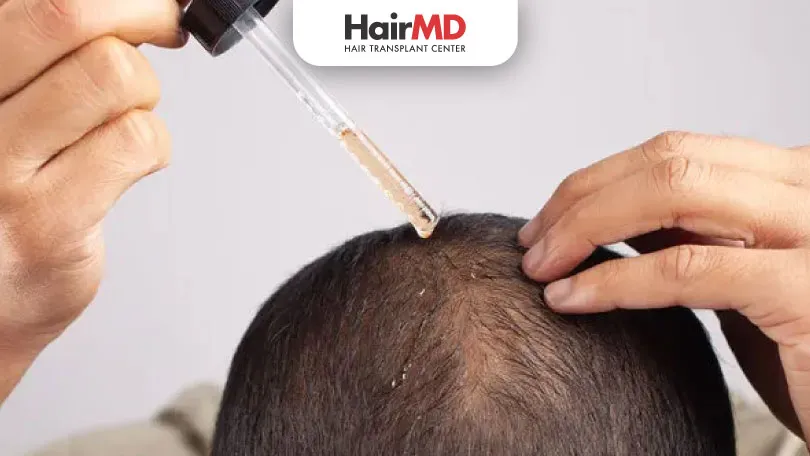11th Sept, 2023

What’s covered in the article?
- What is hair loss?
- Medication for hair fall control
- Conclusion
What is hair loss?
Hair loss refers to a loss of hairs from the scalp or any part of the body. In medical terms hair loss is also called alopecia. Experts mention that the right hair fall treatment depends upon the cause of the hair fall. There are many different causes of alopecia, some of them are permanent, and some are temporary.
Here are some of the common causes that can lead to a situation such as alopecia.
- Hormones and Genes:
You must have noticed the trend of how all the males of a family may have similar patterns of baldness. This is because alopecia can happen due to the genes that run in the family. Also, there are cases where when someone from the same family takes up hair loss treatment, the hair condition also improves. This is because the main cause in the case of a genetic issue is the hormone. Usually, when Dihydrotestosterone in men and estrogen in females increases too much, then they attack the hair follicles, ultimately weakening them.
- Stress:
The next major reason that often leads to excessive hair fall is stress. It has been found in studies that women are prone to the condition of Telogen Effluvium that is a type of alopecia that is caused due to stress. This may not lead to baldness but can cause thinning of the hair. Men may not experience the symptoms as they have shorter hair. Apart from stress, this condition can also happen in women due to some other factors such as childbirth, medications, physical trauma, life changes, and restrictive dieting.
- Nutrition:
Often not intaking the right nutrition can also cause situations such as alopecia in which men may face baldness while women may face thinning of hair. Lack of eminent nutrients such as protein, vitamin D, and iron in the diet can lead to the weakening of the hair follicles that ultimately leads to the problem of alopecia. Hence, in place of experimenting with different hair loss products, you should offer some attention to your nutrition.
- Diseases:
Some health conditions such as thyroid also are an eminent cause of alopecia. If your thyroid level is low or even high, it can cause several changes in the body such as loss of hair, weight gain, problem in the menstrual cycle, and many others.
Medication for hair fall control
Today, there are several medication options available for treating situations of hair fall. But trusting them all is obviously not possible. Here are some of the options for the best medicine for hair fall and growth to rely upon.
1) Minoxidil (Rogaine)
Minoxidil, the US FDA approved medication to treat hair loss. It was initially used to treat high blood pressure but later found to have a side effect of excessive hair growth. And yes isn’t that just convenient for us? It has been approved by the US FDA to be used to combat hair loss. It should be applied directly to the scalp. But as it has many side-effects, it is advised to use under Dermatologists guidance only.
2) Finasteride
Finasteride is more effective than Minoxidil and yields comparatively good results. Generally, It is available in the form of a pill. Finasteride is also a US FDA approved medication, however, its usage may lead to a few side effects, such as decreased sex drive, skin rash, etc. It is mainly a hair loss treatment for men and is advised to be taken only by men with androgenetic hair loss. Women of reproductive age are not usually prescribed Finasteride.
3) Dutasteride
It generally helps to prevent the conversion of testosterone to dihydrotestosterone (DHT) in the human body. Dutasteride, not the US FDA approved medication prescribed for male-pattern baldness. Just like finasteride, Dutasteride is also prescribed to males and not to be used by females.
4) Procapil
Procapil is a new formula that strengthens your hair and helps in preventing hair loss naturally. It also reduces the effects of DHT on hair follicles.
5) Ketoconazole Shampoo
This is one of the best shampoos which really helps in combating hair loss. And it is easily available commercially. It is available in two versions: 1% and 2% ketoconazole. However, this shampoo is advised with Minoxidil and Finasteride to get good results.
If you don’t want to go the medicinal route in a starting phase there are other ways like a balanced diet, massages, regulated sleep cycles, etc to control hair fall. However, these medications or home remedies might or might not resolve the hair loss issue. But a hair transplant technique is a certified hair regrowth treatment with assured results.
Do You Know?
Nearly 250 Patients Visit HairMD
Everyday For Various Hair Concerns?
(You are one click away from flawless skin)
Meet Our Dermatologists
Conclusion
Further Reading
Itchy Scalp and Hair Loss: Causes, Treatments, and Prevention
Itchy scalp and hair loss can be troubling, hinting at deeper scalp and hair health issues. Discover the connection in this comprehensive guide.
Dandruff Fungus Treatment
Learn how dandruff and fungus impact scalp health. With HairMD, you can get expert advice on causes, treatments, and prevention tips to maintain a healthy, flake-free scalp.
Helmet Use and Hair Loss: What You Need to Know
Does wearing a helmet cause hair loss? Understand the connection, debunk myths, and explore preventive tips with expert insights from HairMD.
Top Causes of Hair Loss in Women and How to Address Them
Discover the key causes of hair loss in women, including hormonal changes, stress, and nutritional deficiencies. Learn effective solutions and treatments with HairMD experts.
Have thoughts? Please let us know
We are committed not only to treating you, but also educating you.











